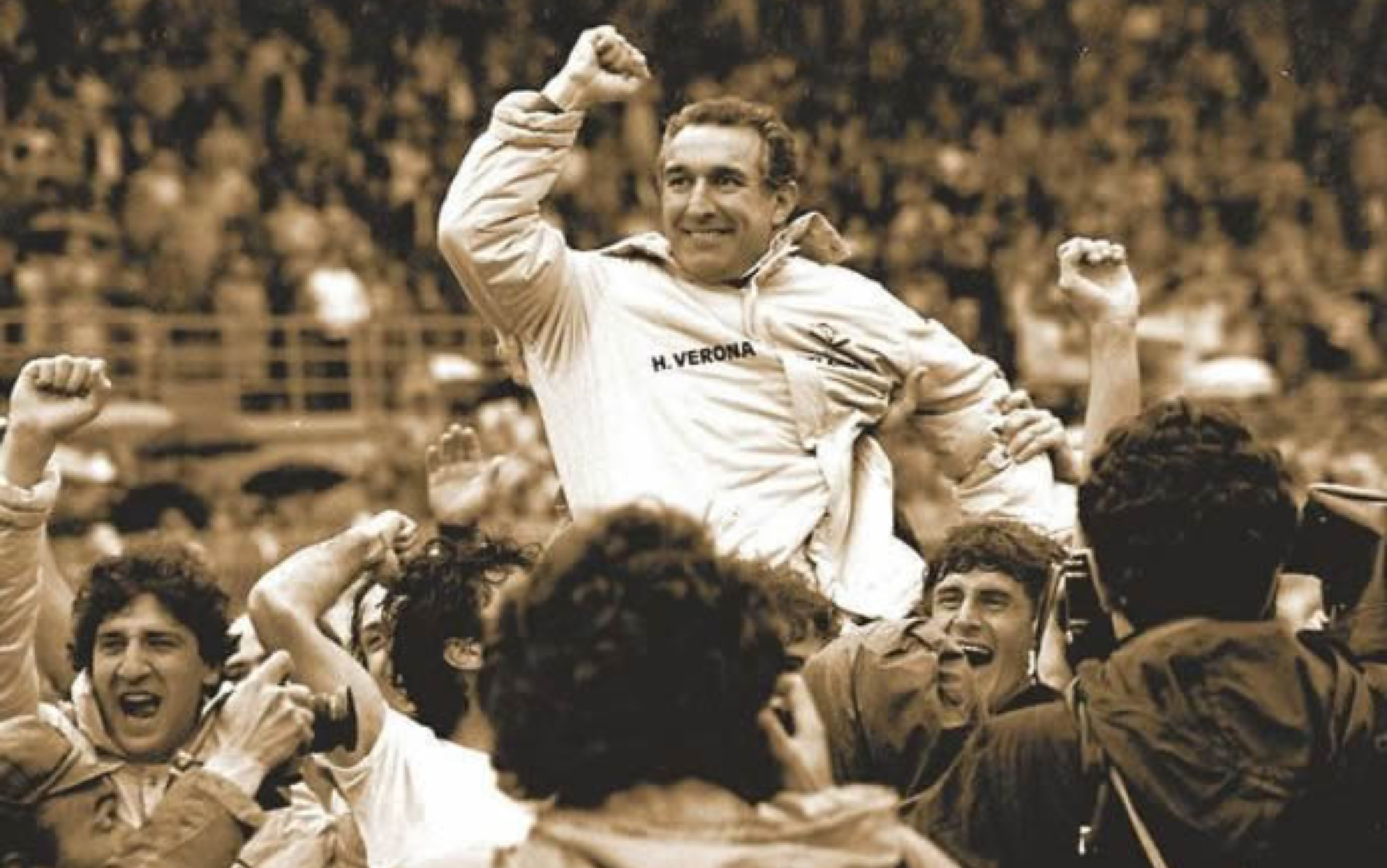On May 12, 1985, people were bracing for a miracle. A whole Italian city caught their breath as they prepared to witness the local football club win their first, and only, Scudetto in their history. That city was Verona.
Hellas Verona traveled to Bergamo to face Atalanta in the penultimate round of the 1984/85 campaign. All they needed was one point. And one point they got, as Preben Elkjaer Larsen canceled Eugenio Perico’s lead.
It was the day that changed the history of calcio and of Verona. For the first time, the second-biggest city of the Veneto region was not only the city of Romeo and Juliet anymore. It was no longer only the city of the Pandoro, a traditional Christmas cake. For one sweet season, Verona would become the capital of Italian football and the best expression of an age when fairy tales were still possible in calcio.
The Serie A was a balanced affair during the 1980s. Between 1982 and 1991, the Scudetto was won by seven different teams in nine years. In the subsequent 31 years, only twice was the title NOT won by either Juventus, Inter or Milan.
But even so, the Gialloblu’s exploit had no precedent in modern times. Verona came out on top of a battle involving Michel Platini’s Juventus, Diego Maradona’s Napoli, Karl Heinz Rummenigge’s Inter, and Paulo Roberto Falcao’s Roma. Even among the so-called “mid-table” clubs, the likes of Fiorentina and Udinese, led by their Brazilian stars Socrates and Zico, seemed better equipped than the Scaligeri.
And yet, it was Verona to lift the trophy, only one season after collecting a remarkable – but nothing more… – sixth place in the table.
The connector, the glue that kept the team together, after building it little by little, was coach Osvaldo Bagnoli. A quiet, mild-mannered man who was also known to be a great motivator, Bagnoli held the reins of Verona for nine years, from 1981 to 1990.
Now aged 86, the legendary Bagnoli has admitted having partially lost his memory in a recent interview with Italian newspaper La Repubblica. What he has not forgotten, though, are the days of his incredible achievement and the drivers behind it:
“We wanted to exploit the motivations of those players who felt excluded in their previous clubs. At Fiorentina, Di Gennaro was benched by Antognoni and Fanna had Causio ahead at Juventus. In Verona, they were free and indispensable. Plus, we made the right signings in the transfer market, Briegel and Elkjaer. Those were days when the players were real men.”
So, who were Bagnoli’s “men” at Verona?
The roster of the Scaligeri was small but solid. The Verona squad from the 1984/85 campaign has been defined a squadra operaia (a “laboring team”), with no absolute talent but an assorted lot of hard-working, reliable players who all knew what they had to do.
There was the robust (chubby?) shot-stopper Claudio Garella with his unorthodox goalkeeping style – which prompted Juventus iconic President Gianni Agnelli to humorously dub him “the best goalkeeper in the world. Without hands.”
There was captain Roberto Tricella, an old-school libero in the days when the sweeper was a key piece in most Italian lineups.
The midfield featured Pietro Fanna, who is one of the only six Italian players to have won the Serie A title with three different clubs (in his case, Juventus, Verona, and Inter), and the Azzurri international Antonio Di Gennaro.
The top scorer was Giuseppe Nanu Galderisi, a Juventus youth academy product who found the back of the net 11 times, an exploit that would earn him a spot among the Azzurri ahead of the 1986 World Cup.
But what really helped Verona make a difference was the arrival of two foreign players whose star had shone during the 1984 European Championship. On the one hand, German veteran Hans-Peter Briegel who, at 29, was in his athletic prime and had already won a Euro Cup and played in a World Cup Final. On the other hand, rising star Elkjaer-Larsen from Denmark, who ended up forming a formidable striking partnership upfront with Galderisi.
The mercurial Dane scored eight goals that season, including the decisive one to Atalanta and another more famous one to Juventus that helped the Scaligeri raid the Stadio Comunale in Turin in an absolute Scudetto six-pointer. Elkjaer Larsen scored despite losing his shoe in the process, an exploit that earned him the nickname Cenerentolo. (“Cinderella Boy”)
Verona built their success on their continuity as they dropped full points only twice during the campionato. With two games left on the calendar, they had built a four-point lead over Torino and Inter.
They needed just one more point for the law of mathematics to certify their victory and their only possible regret was that their next match was scheduled away. If things turned out as expected, they could not celebrate the moment of their triumph at their home Marc’Antonio Bentegodi Stadium.
Not that Verona would feel unsupported in Bergamo. On May 12, some 20000 Gialloblu fans traveled from Verona to the neighboring region to witness their club’s rendezvous with history – making it one of the few games in history when there were more visiting supporters than home crowd in a stadium.
But a courageous mid-table Atalanta, despite having nothing more to ask to their season, were willing to give the capolista a run for their money. Coach Nedo Sonetti’s boys started the game with an offensive approach.
Their efforts were rewarded after just 16 minutes as 22-year-old Roberto Donadoni – a future key piece of Milan’s fantastic winning cycle under Arrigo Sacchi and Fabio Capello – opened a breach into the Gialloblu’s area and served a clinical assist for Perico, who only had to head the ball home from point-blank range.
The Scaligeri’s reaction was relentless but quite inefficient. For the rest of the first half, the Atalanta wall held. Then, on the 51-minute mark, the gods of football gave Verona some help as they teleported the ball in the middle of the box from a Fanna corner kick and left it there where, after a chaotic exchange, Preben Elkjaer Larsen could whip it past Ottorino Piotti to make it 1-1.
That was it. Despite almost 40 minutes still being on the clock, both sides realized that there was no point in trying to hurt each other any further, with Atalanta comfortably far from the danger zone and Verona just waiting to start their historical celebration.
When referee Alberto Boschi blew for full time, a joyful horde of yellow-and-blue fans and flags swarmed to the turf of the Stadio Comunale in Bergamo to hail their heroes and their commander-in-chief Bagnoli. It was a scene we will likely not witness soon. Perhaps never again. The last time a so-called Provinciale, a mid-sized town club, won the Scudetto.
To get an idea of the magnitude of Verona’s achievement, even for the much more leveled standards of 1980s football, let the words of Domenico Volpati – another piece of that magical lineup who eventually turned into a doctor – suffice:
“Today, we just cannot realize what kind of achievement we pulled off. But the course of time will make us understand.”
Considering how football has evolved, he was absolutely right.
MATCH SCORECARD
May 12, 1985 – Serie A 1984-85 Round 29
ATALANTA – VERONA 1-1
SCORERS: 16′ Perico (A), 51′ Elkjaer Larsen (V)
 |
ATALANTA: Piotti, Osti, Gentile, Perico (82′ Codogno), Rossi, Magnocavallo, Donadoni (72′ Soldà), Vella, Magrin, Agostinelli, Pacione (Malizia, Fattori, Larsson) Coach: Sonetti |
| VERONA: Garella (81′ Spuri), Volpati (77′ Ferroni), Marangon, Tricella, Fontolan, Briegel, Fanna, Sacchetti, Galderisi, Di Gennaro, Elkjaer Larsen (Bruni, Donà, Turchetta) Coach: Bagnoli |
REFEREE: Mr. Boschi from Parma

